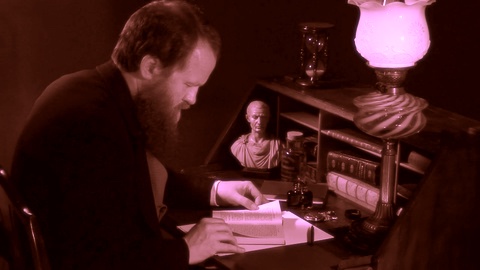My first job out of college was in advertising sales for a television company. I was a lowly administrative assistant to a team of sales executives. Their jobs seemed to consist primarily of squandering their expense accounts pretending to be doing real business over long, boozy lunches with their friends from the big ad agencies. Like most post-Baccalaureates in the dawn of the Clinton Era, my salary was breadcrumbs and I wore cheap wool suits that I bought on sale at Burlington Coat Factory because that’s all I could afford. I felt lucky to have a job.
On my first day of work, I was issued a laminated security pass with my photo on the front. I had a hopeful smile on my face, looking optimistic and ready to join the corporate workforce. I didn’t know any better. Passing this space-age security card over a sensor to open a door felt like an episode of Buck Rogers. I felt important until they assigned me a tiny, gray cubicle with a shoddy Windows PC and a corded telephone that had at least six different extensions. My cubicle was in the middle of a labyrinth of other cubicles. You could only see the crowns of the other assistants’ heads over the sterile, carpeted stanchions. It felt like being… well… quarantined.
The way my corporate colleagues were cooped up, literally, in their pens all day like zoo animals made a deep impression on me. We spent most days making personal phone calls, pilfering potato chips and sugary Snapples from the canteen and embezzling office supplies. Within seven months, the company was acquired and I was laid off with a laughable severance package. They did me a favor because by then I’d already realized that I couldn’t spend the rest of my work life caged in a corporate dystopia.
I lied in my first interview for a waiter job. I made up restaurant names that didn’t exist and supplied fake references. When the manager asked if I knew how to open a bottle of wine, I said of course. He gave me a bottle of cheap, by-the-glass Pinot Grigio and a flat, waiter’s corkscrew to demonstrate. I carefully turned the corkscrew and started pulling up on it without using the hinge. I had never opened a bottle of wine using anything other than my parents rusty, rabbit-ear corkscrew, and the manager knew it the minute he called my bluff. I’m sure he knew my resume was fabricated, too. He hired me out of pity, and I learned the ropes quickly. I was always a good bullshitter and bullshitting seemed like be a critical cognitive skill for a waiter.
As time progressed, I found more lucrative, steady work in hospitality. My restaurant coworkers were different from the corporate zombies that lurked lifelessly inside the mausoleum of cubicles in my old office. When restaurant people went out after work, it was like the day was just beginning. There was no such thing as a “school night.” Dealing with customers could be challenging, but the environment wasn’t oppressive like an office. Working on your feet, moving freely through space made you feel less like a captive. Conversations with strangers at my tables would often lead to personal connections, the kind I never could’ve experienced in the corporate realm.

When the restaurant industry collectively went comatose last week because of the COVID-19 pandemic, it caught everyone in the industry by surprise. We’re accustomed to opening our doors come hell or high water. Even in the wake of 9/11, many restaurants in New York City reopened quickly because people needed places to gather, grieve and be nourished. Of course, income for tipped employees has always fluctuated with economic trends, but, unlike most corporate salaries, it’s always been somewhat recession proof. The Coronavirus outbreak has created conditions unlike any we’ve ever seen in the restaurant world—layoffs, furloughs, pay cuts. These things were only supposed to happen to people who work in cubicles. Not us.
Without the stimulation of my restaurant routine, a smog of depression started to form. I began feeling withdrawal symptoms from the adrenaline rush of a busy service. I’ve become so accustomed to the daily anxiety of waiting too long for a table’s food or the exhilaration of a busy night or a generous tip. Many restaurant professionals manufacture these tensions to heighten their sense of urgency in the workplace. Some thrive on it, others are destroyed by it.
Beyond the obvious financial shortfall, being displaced from our restaurant families has been one of the biggest challenges. We are pillars of strength for each other—sharing staff meals together and making the same crass inside jokes. Enemies become friends, and friends become enemies, but we usually end up putting our differences aside. We know each other’s spouses, we become friends with each other’s friends and we nurture each other’s aspirations outside of the restaurant. Our social network is more durable than other industries because we go through so much together—the collective pain endured through self-sacrifice strengthens the ties that bind us.
This crisis has undoubtedly been hard on the people we serve, too. For people who love restaurants, this hiatus should serve as a sobering reminder of just how important their local restaurants are to their daily lives. Restaurants have always been there to graciously serve you, but you should never act like paying for things makes you a stakeholder in their businesses. When this is over, I hope that many of these entitled habits will die and people will dine more quietly, with a deeper respect for the work that goes into crafting great restaurant experiences.
Restaurant people are a rare breed. We’re survivors. We hustle more than everyone else. We’re independent and stubborn. Our parents didn’t pay our way. We earned it. Some of us have passions that we can only pursue with the supplemental income of our restaurants jobs. I wouldn’t be writing this if it wasn’t for the countless tables I’ve served to fund and grow this pursuit. All those years have taken their toll on my knees and my mental health, but I wouldn’t trade it for an instant to have to go back to the prison of a cubicle, no matter how much money they paid me.

